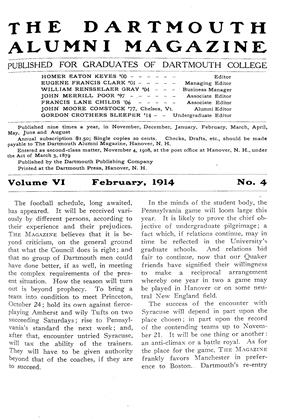The Story of California. By Henry K. Norton, Chicago, A. C. McClurg & Company, 1913. Pp. 390.
Mr. Norton of the class of 190o, now a lawyer of Los Angeles, has evidently fallen under the spell of the romance of California history. Many of-her adopted sons do so, but few have given such concrete expression to the fascination they feel. Rarely does a state display so openly to traveler or resident the many indications of its early history. Counties, towns, rivers, mountains, and even city streets are named in honor of Indian tribes, Spaniards, Mexicans, and of Americans prominent in the conquest or early settlement of the state. One experiences a genuine pleasure in reading a book that brings to memory so vividly the personalities associated with these names.
The preface reads: "The present work is the result of an endeavor to bring within the limits of one volume the narrative of all the important events which make up the history of the state of California, in order that it may be available to the many who have not the time nor the inclination to read through the vast amount of print which contains the record". The book satisfies exactly these conditions. The seven elaborate volumes devoted to California by Bancroft are a monument to the industry of Bancroft's assistants, but the despair of the average reader. Richman's excellent volume covers merely the period of Spanish and Mexican control. Royce's book in the "American Commonwealths" series treats only the time from the American conquest to that of the second vigilance committee in San Francisco in 1856. There is, therefore, ample room for a single volume introducing the reader to the history of the state from its discover" to the present time.
Mr. Norton's book is written in a lucid style, and has for its chief characteristic orderliness of arrangement. Only one real error, and that a minor one, has been noted, and two or three examples of careless statement. One could wish that the romance, the chivalry, the glitter, and the delights of life during the Mexican regime had received fuller treatment. All the good stories still told in Monterey by the descendants of those who came there in the time of their honored padre Junipero Serra give a picture to which no book yet written does justice. One could also wish that the condemnation of. modern political conditions had been less severe. Those who were in California in 1896 when the decision was rendered in the case of the federal government against the Stanford estate saw that California had forgiven the Central and Southern Pacific for their assumed iniquities. These are but indications of what perhaps only the reviewer would like to see changed. It is a good book, and we gladly welcome it to the Alumni Alcove.
 View Full Issue
View Full Issue
More From This Issue
-
 Article
ArticleTHE STATUS OF COLLEGE FRATERNITIES
February 1914 By Homer Eaton Keyes -
 Class Notes
Class NotesFRANK S. BLACK
February 1914 By WILBUR H. POWERS '75 -
 Class Notes
Class NotesLOCAL ASSOCIATIONS
February 1914 -
 Article
ArticleThe football schedule, long awaited,
February 1914 -
 Class Notes
Class NotesCLASS SECRETARIES
February 1914 -
 Article
ArticleNEW QUARTERS FOR THE BANK
February 1914








